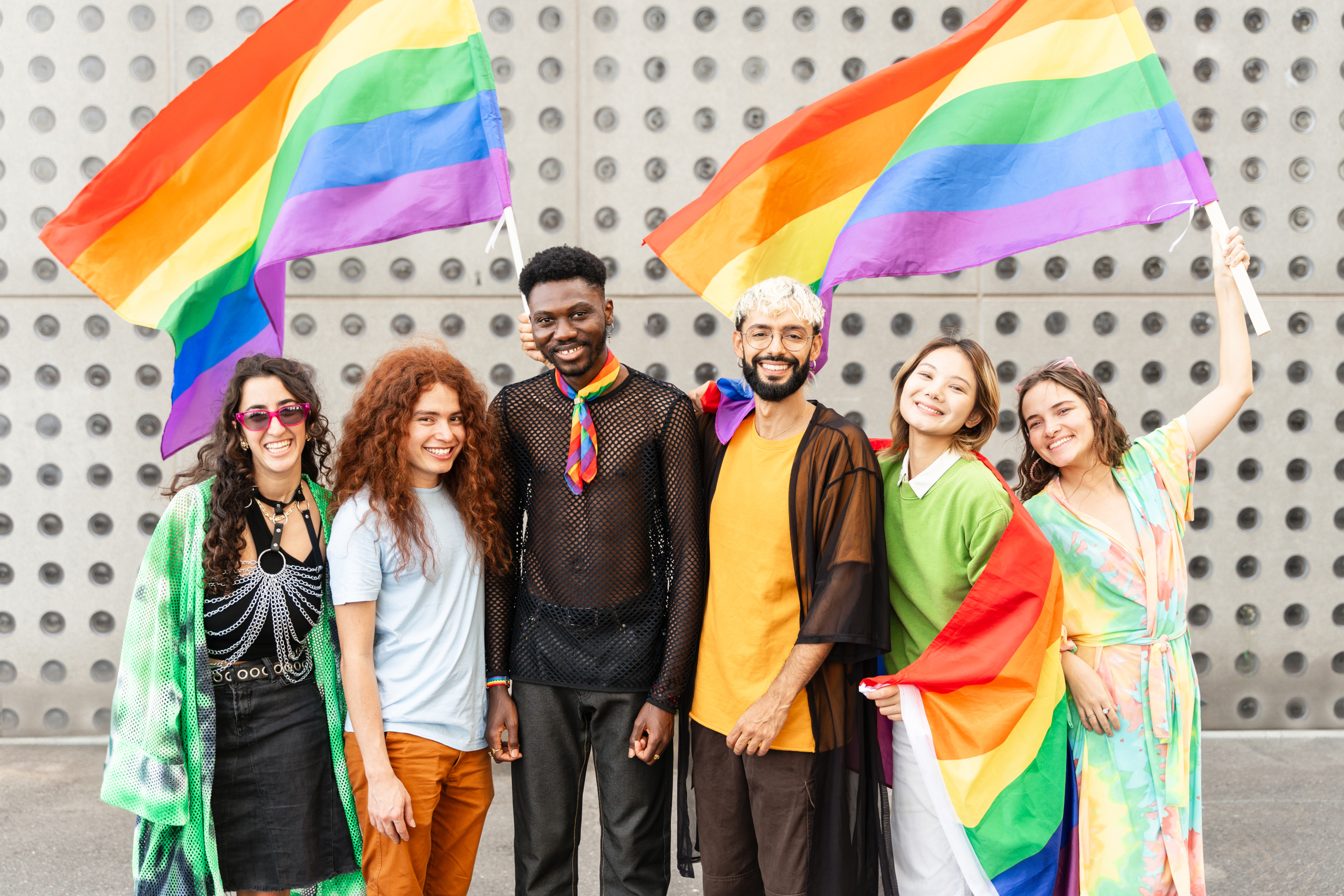Do you and/or your loved ones identify as part of the LGBTQIA+ communities? While Canada has made great strides over the years to promote gender and sexual equity, recent events and news may make this community feel unsafe. Overall, there is still a great deal to be done to improve accessibility of mental health services for LGBTQIA+ individuals in a heteronormative society. That’s why offering LGBTQIA+ affirmative therapy in the Greater Toronto Area and Ontario as a whole is so crucial to ensure that these communities have equal access to essential mental health services.
LGBTQIA+ affirmative therapy plays a vital role in providing mental health support for individuals who identify as lesbian, gay, bisexual, transgender, intersex, queer/questioning, asexual, plus more. This therapeutic approach acknowledges and validates the distinct experiences and needs of LGBTQIA+ individuals. It is characterized by its inclusivity, respectfulness, and validation of diverse sexual orientations and gender identities.
In this article, we explore the significance and benefits of LGBTQIA+ affirmative therapy and how it can enhance the mental well-being of not only local communities, but also across Canada.
Why LGBTQIA+ Affirmative Therapy Matters
LGBTQIA+ affirmative therapy is a specialized form of counselling designed to provide a safe and supportive environment for individuals to explore their gender, sexual orientation, identities, relationships, and experiences. This therapy approach recognizes the societal and systemic challenges that LGBTQIA+ individuals often encounter, including discrimination, prejudice, and minority stress.
Individuals who identify as LGBTQIA+ often encounter unique stressors that can pose challenges in accessing mental health care tailored to their specific needs. They are disproportionately subjected to violence, discrimination, and stigma compared to heterosexual counterparts, leading to heightened anxiety regarding their employment, relationships, and physical well-being. Research indicates that LGBTQIA+ individuals are 2.5 times more likely to experience mental health and substance abuse issues in their lifetime compared with heterosexual people.
While individuals from marginalized communities seek therapy for similar reasons as others, their unique life experiences are often influenced by their identities. Affirmative therapy sessions involve therapists using verbal and nonverbal cues to convey an affirming stance towards clients, with the aim of creating a supportive and positive environment.
History and Background of Affirmative Therapy
Psychologist Alan K. Malyon is recognized for establishing LGBTQIA+ affirmative therapy in 1982. He outlined a therapeutic approach aimed at addressing internalized homophobia among gay men.
This groundbreaking work marked a significant advancement in the field of psychology, providing a framework for supporting individuals within the LGBTQIA+ community. As a gay man himself, Dr. Malyon was passionate about providing effective therapy for individuals within the LGBTQIA+ community. He emphasized the importance of affirming a client’s identity and valuing it, rather than attempting to change their sexual orientation.
Dr. Malyon’s research was conducted during a time when homosexuality was still stigmatized within the field of psychology. The American Psychiatric Association did not remove “homosexuality” as a diagnosis from the Diagnostic and Statistical Manual of Mental Disorders (DSM) until 1973, and it was not removed from the International Classification of Diseases (ICD-10) until 1990.
Dr. Malyon speculated that by acknowledging and validating the identities of marginalized clients, therapists could play a crucial role in helping them attain improved well-being and self-fulfillment. His innovative approach to therapy has had a lasting impact on the field of psychology and continues to be a vital tool in supporting individuals within the LGBTQIA+ community.
Malyon also detailed the phases involved in affirmative therapy:
- The first phase involves building rapport and establishing a therapeutic partnership with clients, creating a foundation of trust and understanding.
- In the second phase, therapists analyze and evaluate clients’ conflicts to gain insight into their attitudes and cognitive processes, helping them to navigate and overcome challenges.
- Moving into the third phase, therapists work with clients to consolidate their identities and nurture the development of intimate relationships, promoting a sense of self-awareness and connection.
- Finally, the fourth phase focuses on helping clients establish a personal sense of meaning and purpose, guiding them towards a fulfilling and purposeful life.
What are the Benefits of LGBTQIA+ Affirmative Therapy?
The benefits of affirmative therapy for both therapists and clients are numerous. Therapists can help clients address internalized biases, homophobia, and transphobia, while also acknowledging the challenges faced by LGBTQIA+ individuals in their daily lives. Additionally, therapists can provide valuable support and resources, reduce judgmental behaviour towards those with non-traditional gender identities, and assist clients in reconciling conflicting beliefs with their identities.
Therapists trained in affirmative therapy possess a deep understanding of the obstacles their clients encounter, such as stigma, discrimination, lack of support, and underrepresentation. These challenges are addressed during therapy sessions, allowing therapists to provide tailored support and guidance to their clients.
Affirmative therapists are well-versed in LGBTQIA+ issues and strive to create a non-judgmental and secure space where clients can openly express themselves and embark on a journey of self-discovery. By fostering a supportive and understanding atmosphere, LGBTQIA+ affirmative therapy aims to empower individuals to embrace their authentic selves and navigate the complexities of their identities with confidence and resilience.
Putting Dr. Malyon’s phases into practice, what can we see as the outcome of these therapy sessions?
Validation and Acceptance
LGBTQIA+ affirmative therapy offers a safe and welcoming environment for individuals to embrace their true selves. This validation enables clients to challenge internalized stigma and nurture a positive LGBTQIA+ identity.
Emotional Support
Affirmative therapists are highly skilled in addressing the specific mental health needs of LGBTQIA+ individuals, such as anxiety, depression, and self-esteem issues. They provide compassionate support and help clients develop effective coping strategies to overcome these obstacles.
Identity Exploration
LGBTQIA+ affirmative therapy provides individuals with a safe and supportive environment to explore and understand their sexual orientation, gender identity, and expressions. This therapeutic approach empowers clients to embrace their true selves, encouraging self-acceptance and self-discovery.
Building Resilience
Affirmative therapists play a crucial role in supporting clients in encouraging resilience when confronted with adversity. Through addressing minority stress and discrimination, therapy serves as a valuable tool in enhancing coping mechanisms and nurturing emotional fortitude.
Healthy Relationships
LGBTQIA+ affirmative therapy focuses on navigating the difficulties of relationships within the community. Therapists offer support in enhancing communication, negotiation skills, and establishing healthy boundaries to help clients nurture meaningful and satisfying relationships.
Coming Out Support
Coming out is a significant milestone in the lives of many LGBTQIA+ individuals. It is a pivotal moment where individuals embrace their true selves and share their authentic identity with others. Affirmative therapists play a crucial role in providing support throughout this journey, assisting clients in managing their emotions, overcoming challenges, and addressing potential reactions from family members or society at large.
Education and Resources
LGBTQIA+ affirmative therapists offer education and resources on LGBTQIA+ issues, assist clients in understanding their rights, access healthcare, and connect with community organizations. This knowledge empowers individuals to effectively advocate for themselves and their community.
Family and Couples Therapy
Affirmative therapy has broadened its scope to encompass the dynamics of families and couples. Therapists work to develop understanding, acceptance, and open communication within family units and relationships.
Mental Health Maintenance
LGBTQIA+ affirmative therapy is designed to enhance overall mental well-being by offering strategies for self-care, stress management, and emotional regulation. This approach emphasizes the importance of prioritizing mental health and seeking ongoing support as needed.
Cultivating Respected Identities
Affirmative therapy acknowledges the intersectionality of LGBTQIA+ identities and recognizes the unique challenges faced by individuals with multiple marginalized identities. This approach assists clients in cultivating respect and acceptance for their entire selves.
From Stigma to Strength: We Provide a Safe Space to Heal and Grow
If you believe that this therapy is the right fit for you or your loved ones, we are here with the guidance and support you need. LGBTQIA+ affirmative therapy plays a crucial role in enhancing the mental health and overall well-being of individuals within the LGBTQIA+ community. This specialized form of therapy offers a safe and validating environment for individuals to explore their identities, encourage self-acceptance, and build resilience.
At Hopewoods, our therapists are not only open-minded but also highly experienced in working with LGBTQIA+ individuals, couples, and families. They possess a deep understanding of the unique challenges that individuals within this community may encounter on their journey towards self-discovery and acceptance.
Our compassionate and knowledgeable therapists provide emotional support, nurturing healthy relationships, and facilitating personal growth. Through the utilization of LGBTQIA+ affirmative therapy, individuals can embark on a transformative journey of self-discovery, healing, and empowerment. This invaluable resource significantly contributes to the mental well-being and overall flourishing of the LGBTQIA+ community.
If you have any questions regarding LGBTQIA+ affirmative therapy or our assessments and services, contact us directly today 或 预约 30 分钟免费咨询.









 通过
通过